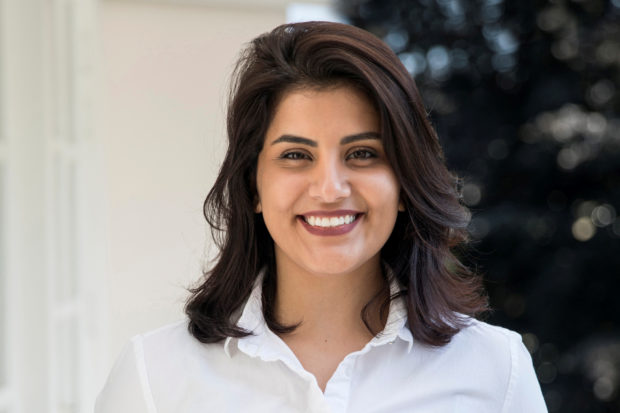
FILE PHOTO: Saudi women’s rights activist Loujain al-Hathloul is seen in this undated handout picture. Marieke Wijntjes/Handout via REUTERS
DUBAI – A Saudi court on Monday sentenced prominent women’s rights activist Loujain al-Hathloul to nearly six years in prison, her family said, after her conviction in a trial that has drawn international condemnation.
The verdict and sentence pose a challenge to Crown Prince Mohammed bin Salman’s relationship with U.S. President-elect Joe Biden, who has criticised Riyadh’s human rights record.
Hathloul, 31, who has been held since 2018 following her arrest along with several other women’s rights activists, will appeal the sentence, her sister said.
She was charged with seeking to change the Saudi political system and harming national security, Saudi newspapers Sabq and al-Shark al-Awsat said, under broad counter-terrorism laws.
The court suspended two years and 10 months of her sentence of five years and eight months – most already served since her arrest on May 15, 2018 – with a conditional release to follow, Hathloul’s sister, Lina, said.
She could therefore be released by March 2021, with a return to prison possible if she commits any crime, the newspapers said.
Hathloul was also banned from travel for five years, her sister said, adding that Hathloul cried when she was sentenced and will appeal.
“My sister is not a terrorist, she is an activist. To be sentenced for her activism for the very reforms that MBS and the Saudi kingdom so proudly tout is the ultimate hypocrisy,” Lina said in a statement.
U.S. State Department spokesman Cale Brown said the United States was “concerned by reports” of Hathloul’s sentence.
“We’ve emphasized the importance of free expression and peaceful activism in Saudi Arabia as it advances women’s rights. We look forward to her anticipated early release in 2021,” he said on Twitter.
Jake Sullivan, Biden’s incoming national security adviser, appeared to reaffirm on Twitter that the Biden administration plans to elevate human rights issues in relations with Riyadh.
Hathloul’s sentencing “for simply exercising her universal rights is unjust and troubling,” Sullivan wrote in a tweet. “As we have said, the Biden-Harris administration will stand up against human rights violations wherever they occur.”
United Nations human rights experts have called the charges “spurious.” The U.N. human rights office said the conviction was “deeply troubling” and called for her urgent release.
Rights groups and her family say Hathloul, who campaigned for women’s right to drive and to end the kingdom’s male guardianship system, was subjected to abuse, including electric shocks, waterboarding, flogging and sexual assault. Saudi authorities have denied the charges.
In 2019, Hathloul refused to rescind her allegations of torture in exchange for early release, her family has said. A court last week dismissed the allegations, citing a lack of evidence.
Sabq and al-Shark al-Awsat reported the judge said had Hathloul confessed to the crimes without coercion.
Hathloul’s sentencing came nearly three weeks after a Riyadh court jailed U.S.-Saudi physician Walid al-Fitaihi for six years, despite U.S. pressure to release him, in a case activists have called politically motivated.
Foreign diplomats said their trials aimed to send a message at home and abroad that Saudi Arabia would not yield to pressure on human rights issues.
Riyadh could also use the sentences as leverage in future negotiations with the Biden administration, one diplomat said.
Biden has said he will take a firmer line with the kingdom, an oil titan and a major buyer of American arms, than President Donald Trump, who was a strong supporter of Prince Mohammed and provided a buffer against international criticism following the murder of Saudi journalist Jamal Khashoggi.
CHARGE SHEET
Hathloul rose to prominence in 2013 when she began publicly campaigning for women’s right to drive.
Saudi officials have said the arrests of women activists were made on suspicion of harming Saudi interests and offering support to hostile elements abroad.
London-based Saudi rights group ALQST said another activist, Mayaa al-Zahrani, was also convicted on Monday and given the same sentence as Hathloul. In addition, Nassimah al-Saadah was sentenced to five years in prison with two suspended in late November, according to Human Rights Watch.
Hathloul’s family published her indictment after her case was transferred to Riyadh’s Specialised Criminal Court, originally established to try terrorism suspects but which has been used over the past decade to prosecute perceived dissidents.
The main charges against Hathloul, which carried up to 20 years in prison, included seeking to change the Saudi political system, calling for an end to male guardianship, attempting to apply for a U.N. job, and communicating with international rights groups and Saudi activists.
Hathloul was also charged with speaking to foreign diplomats and with international media about women’s rights in the kingdom, including Reuters, which declined to comment.
“The case against Loujain, based solely on her human rights activism, is a travesty of justice and reveals the depths to which they will go to root out independent voices,” said Adam Coogle of Human Rights Watch.
The Saudi government media office did not respond to a Reuters request for comment.